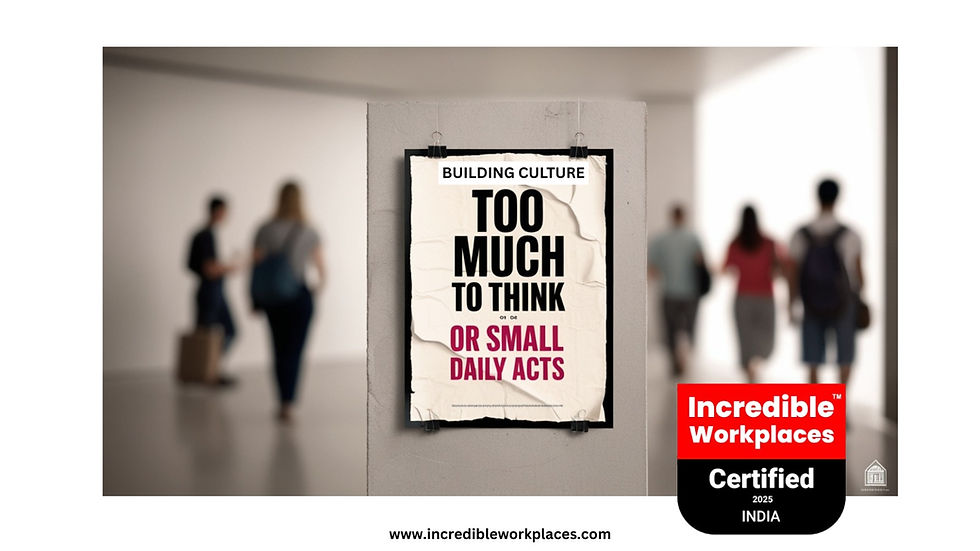Building Culture – Too Much To Think or Small Daily Acts
- Akash Singh
- Aug 26, 2025
- 2 min read
Updated: Aug 28, 2025

In the rapidly evolving landscape of work, one truth remains constant: culture drives performance. And at the heart of every strong culture is a foundation of discipline, not in the punitive sense, but in the form of structure, consistency, and accountability.
Leaders have a role not just to manage people, but to shape environments where good habits can thrive because ultimately, habits determine culture, and culture determines success.
The Root: Discipline
Discipline is not about control; it is about creating a stable foundation that allows individuals and teams to grow, contribute, and thrive.
According to a 2023 Gallup study, highly structured organizations see 21% higher profitability and 17% higher productivity than those with less defined systems. This proves that discipline enables performance, rather than suppressing it.
“One who has control over the mind is tranquil in heat and cold, in pleasure and pain, and in honor and dishonor.”
: Bhagavad Gita (Chapter 6, Verse 7)
The Ripple Effect: Good Habits
Discipline gives rise to good habits, and habits form the behavioural fabric of any organization. When practiced over time, these habits create psychological safety, professionalism, and a sense of shared responsibility.
A 2024 Harvard Business Review study found that organizations focusing on habit-forming practices (structured onboarding, time tracking, daily feedback) saw a 30% increase in employee engagement within one year.
“Watch your thoughts, for they become words.
Watch your words, for they become actions.
Watch your actions, for they become habits.
Watch your habits, for they become character. Watch your character, for it becomes your destiny.”
Ancient Proverb
Examples of impactful habits include:
• Punctuality and time ownership
• Proactive communication
• Adherence to processes
• Respecting shared spaces and roles
The Result: A Progressive Culture
When good habits are practiced across an organization, they shape a culture of trust, performance, and progress. This is where the real transformation happens, not through policy alone, but through behaviour.
In Deloitte’s 2025 Global Human Capital Trends Report, 94% of executives acknowledged that “culture is critical to business success”, yet only 19% believed their culture was aligned with their goals.
A disciplined and habit-driven culture enables:
• Efficient decision-making
• Constructive conflict resolution
• Greater accountability
• Psychological safety
• Long-term, scalable growth
Conclusion
Culture isn’t built overnight. It’s built in the small, daily acts of discipline, the habits that follow, and the environment we consistently nurture.
“Through self-discipline comes freedom.” — Aristotle
Let’s champion the kind of discipline that cultivates good habits—because in doing so, we shape the progressive, accountable, and human-centred workplaces of tomorrow.
Discipline cultivates good habits – good habits cultivate a desired, progressive culture.
References:
• Gallup State of the Global Workplace Report, 2023
• Harvard Business Review, “Habits of High-Performing Teams”, Jan 2024
• Deloitte Human Capital Trends, 2025
• Bhagavad Gita (Chapter 6, Verse 7)
• Ancient Wisdom Proverbs




Comments